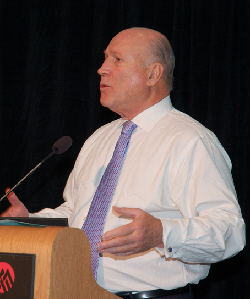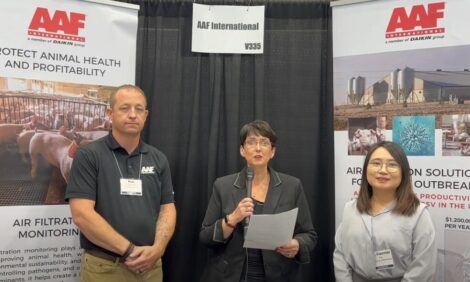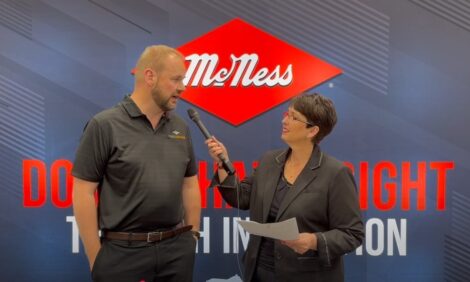



Full Court Press on the Activist Agenda
Producers need to take back control from animal activists and be ready with an offence strategy, attendees at this year's Banff Pork Seminar heard."Game on." That is the attitude that Rick Berman has when he looks at the challenge animal activist groups pose for livestock industries. It is a mind-set the pork industry, and others in animal agriculture, would do well to adopt, he told a cross-section of producers and industry players at the 2012 Banff Pork Seminar, according to Meristem Land and Science.

"These advocacy groups are changing the conversation," said Mr Berman, a leading consultant on public affairs and activist issues with Washington D.C.-based Berman and Company. "They are remaking the world in their image. They will keep demanding new changes. And once you change they move the goal posts again. We know where this is going - you can't legitimise them or reason with them. You need to take back control and have an offence strategy."
Know the Challenger
That strategy starts with knowing what the industry is up against - more specifically who it is up against in groups such as People for the Ethical Treatment of Animals (PETA) and the Humane Society of the United States (HSUS).
Mr Berman sees these players as part of a broader rise in activist groups. Each is unique but tends to focus on one of three areas - issues related to labour, food, or energy and environment.
The most effective and high profile of these are very sophisticated in knowing the game of influencing public perception. They often have extreme agendas, such as, in the case of the food example, ending meat production. Yet they are remarkably skilled in portraying a more moderate image and misleading the public while building massive funding support.
"What are these groups about, really, and where are they taking us?" asked Mr Berman. "That's where we need to drill down and focus."
Drilling Down
Groups such as PETA and Mercy for Animals are transparent as activist groups focused on 'animal rights', he says. HSUS and its true agenda have been harder for the public to recognise. This organization has maintained a front focused on animal welfare and humane care but make no mistake, said Mr Berman, it is in lock step in viewpoint and agenda with the animal rights groups. Statement such as 'the meat industry equals systematic murder' are part of its rhetoric.
"Is this really a group you can negotiate with?" asked Mr Berman. "We're talking about people who represent a vegan culture, who are basically equating animals with people and advocating an end to eating meat. It's animal rights and an extreme agenda masquerading as animal welfare."
Expose the Real Agenda
If HSUS disclosed its true agenda, it would be out of business, he believes. But by portraying itself as a welfare organisation and manipulating the public consciousness, it has become a gargantuan money machine collecting over $130 million annually to support its true anti-meat agenda.
Mr Berman said: "Groups like this are constantly looking for ways to make their points seem legitimate and mainstream, to get the support they need to advance their own self-interest and true agenda."
In the case of HSUS, people believe a lot of what this organisation does is support humane shelters. In reality, less than one per cent of HSUS funding goes to shelters, according to Mr Berman, while greater than five per cent goes to the organisation pension fund. The vast majority goes to campaigns, lobbying and related efforts aimed at continually demonising and reducing meat production. A huge chunk of HSUS dollars from public donations go to staffing its ever-growing army of lawyers.
"My issue is, who gave these people the mandate to be achieving their goals? They are not elected or appointed by an elected body. They simply mislead and manipulate, to collect money, affect opinion and advance an agenda that many people who support them do not understand," said Mr Berman.
* "Livestock industries need to get far more aggressive in exposing the true nature and aims of the activist groups" |
Make Real Change that Makes Sense
Major retailers and some industry organisations that have worked with HSUS to make agreements on changes are making a huge mistake, he believes. "They are not a real reflection of what the public or consumers want. And once you agree to one change, they just keep going and asking for more. You can't satisfy people whose end goal is the abolition of animal agriculture."
There are legitimate animal welfare and care improvements industry has made and will continue to make, he said. "But be careful. Make sure the reasons you are changing are the right ones. Keep a strong relationship with your consumers and don't let you or them get caught in someone else's agenda."
Livestock industries need to get far more aggressive in exposing the true nature and aims of the activist groups, he said. That is starting to happen with efforts such as www.humanewatch.org.
Get Tough and Stay the Course
"The bottom line for me is there's a scam going on here," says Mr Berman. "People need to see what the HSUS is really about."
The leading animal rights groups are masters of the public opinion game, he said. They know how to re-frame issues, re-position opposition and diminish moral authority. Livestock industries need to compete at the same game.
The Real Cost
Ultimately, animal agriculture can have the upper hand because it can make its case on legitimate facts rather than with the misinformation and hidden agendas that define its opponents.
"Their game is all optics, not facts," said Mr Berman. "We need to hold a light up to that and let the public see what's really going on."
Winning the PR battle will not be easy and will require substantial effort, he added. "What's the cost of winning? I don't know. But I can tell you it's much cheaper than the cost of losing."
February 2013






